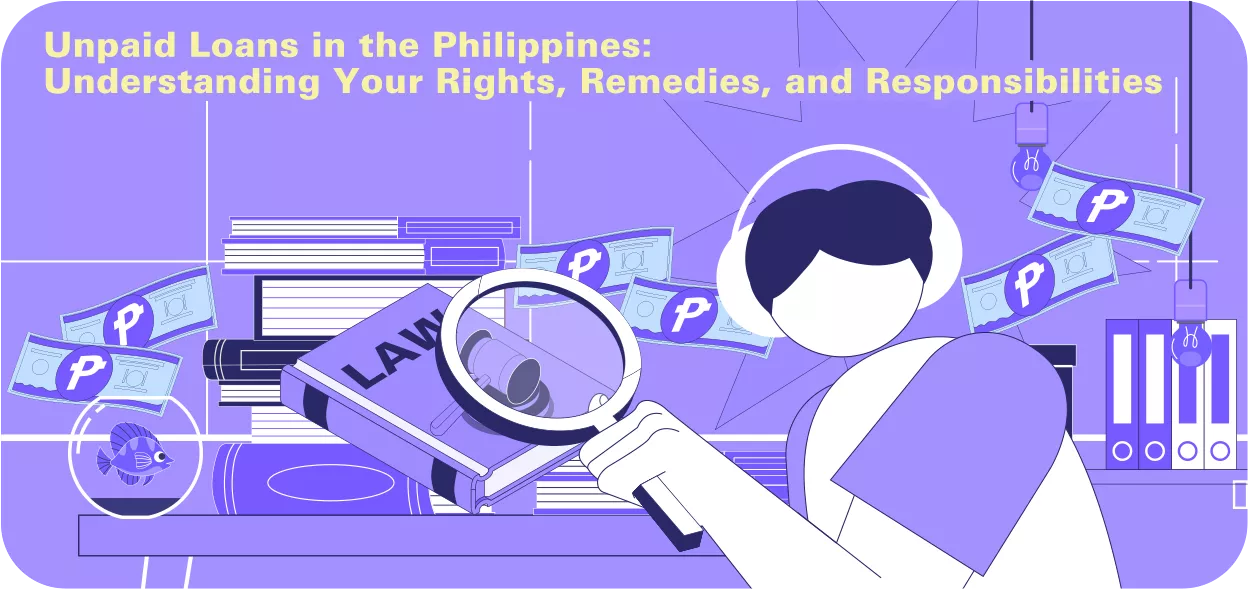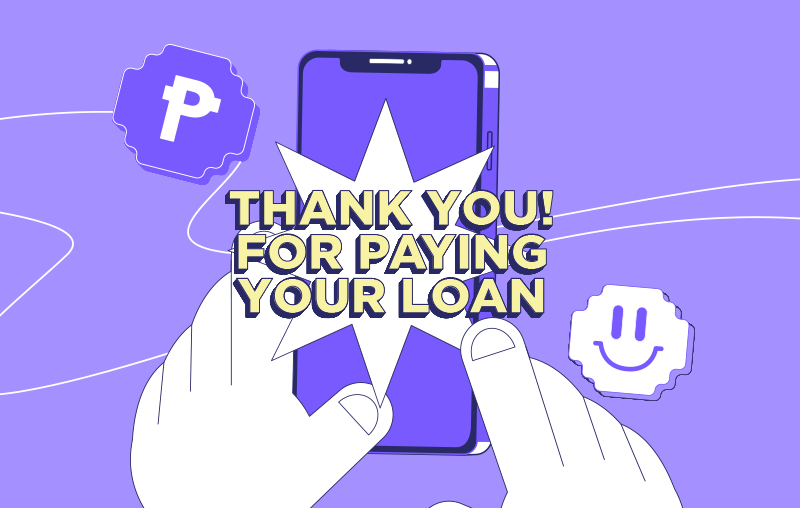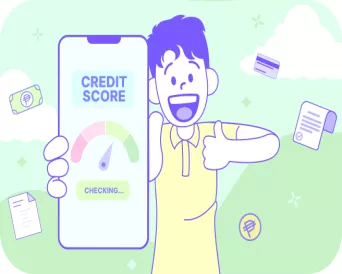
Unpaid Loans in the Philippines: Understanding Your Rights, Remedies, and Responsibilities
Quick Take: Can I go to jail for not paying online loans in the Philippines?
Fortunately, you can't be jailed in the Philippines for not repaying loans, as stated in the Philippine Constitution. Instead, creditors may file civil cases to enforce repayment, including interest or penalties if applicable.
Are you feeling overwhelmed by unpaid loans? Don’t worry, luv, we got you covered! In this blog, we'll dive into the nitty-gritty of unpaid loans. The goal is to help you understand your rights, remedies, and responsibilities under Philippine law.
Whether you're dealing with debt collection, online loans, or credit card debt, we'll provide you with valuable insights and expert advice to navigate this complex landscape. Get ready to take control of your financial well-being as we unravel the mysteries of unpaid loans in the Philippines. Let's dive right in!
Table of Contents
- The Legal Definition of Loan
- Types of Money Loans Recognized by Philippine Law
- Rights and Obligations of the Creditor
- Remedies in case of default
- Rights and Obligations of the Borrower
- Consequences of Unpaid Loans
- Possible defenses against debt collection
- The Concept of Insolvency and Bankruptcy
- Alternative Dispute Resolution
- Advantages of Alternative Dispute Resolution
- Tips on Managing and Settling Debts
- Conclusion
Tired of High-Interest Loans?
A solid credit history can unlock better loan terms. Start building with Tonik Credit Builder Loan!
The Legal Definition of Loan
Skip this portion of unpaid loans if you’re allergic to legalese, hun!
If you take a peek at the Civil Code of the Philippines, specifically in Article 1933, you’ll find an interesting definition of a loan. It states that a loan can be one of two things: a commodatum or a mutuum.
A commodatum is a non-consumable item that is borrowed by someone for a certain time. For example, if your friend borrows your car or your laptop, this kind of loan is considered a commodatum.
A mutuum, on the other hand, is a consumable thing that must either be returned or repaid in the same amount. For the purposes of this discussion, we’ll be referring to loan as the monetary obligation enforceable at law that is owed by a debtor… in other words we’re going to talk about money loans.
TOCTypes of Money Loans Recognized by Philippine Law
- Personal Loans: Personal loans are the most common type of money loans in the Philippines. They can be used for various purposes, such as investments, medical bills, or vacation expenses.
- Business Loans: Business loans are specifically designed to provide financing for businesses. They can be used for capital investments, expansion, working capital, or other business-related needs.
- Car Loans: Car loans, also known as auto loans, are loans specifically used for purchasing a vehicle. The car itself serves as collateral for the loan.
- Housing Loans: Housing loans, also known as home loans or mortgage loans, are loans used for purchasing or constructing a residential property. The property serves as collateral for the loan.
- Payroll Loans: Payroll loans are loans offered by banks and lending institutions to employees of companies that have a deposit arrangement with the bank. If you’re taking out a payroll loan, your salary is used as collateral for your loan..
- Cash Loans: Cash loans are loans that provide immediate cash assistance. They can be obtained from banks and other financial institutions.
- Credit Card Cash Advances: Credit card cash advances allow cardholders to withdraw cash from their credit card limit. The withdrawn amount is considered a loan and is subject to interest charges.
- Collateral Loans: Collateral loans are secured loans where an asset, such as property or a car, is pledged as collateral to obtain a loan. The lender holds the asset as security until the debt is repaid. Due to its nature, collateral loans usually have bigger loan amounts.
Rights and Obligations of the Creditor
When it comes to financial agreements and unpaid loans, creditors have certain rights and obligations outlined in the Civil Code of the Philippines. These include:
| Rights of Creditors | Obligations of Creditors |
|
|

Remedies in case of default
When a borrower can’t pay their loan, creditors in the Philippines have several remedies available to them. Here are just a few:
- Legal action: Creditors may take legal action to collect unpaid loans. This can include filing a lawsuit or seeking a court order to enforce payment.
- Foreclosure sale: In the event of default, the creditor cannot automatically appropriate any collateral used to secure the loan. This means they can conduct a foreclosure sale to recover unpaid loans.
- Suspension of payments or liquidation: If you’re having difficulties in paying your money loan, you may officially apply for the suspension of payments or liquidation.
- Voluntary court-supervised rehabilitation: You can petition for a court-supervised financial rehabilitation to help you pay your debts
Take note that specific remedies available may vary depending on a case-to-case basis. If you’re about to default on your loan, better consult with legal professionals to make the right moves.
TOCRights and Obligations of the Borrower
Of course, if debtors have rights and obligations, so do borrowers! Here are just some of the rights and obligations of borrowers in the Philippines:
| Rights of Borrowers | Obligations of Borrowers |
|
|
Consequences of Unpaid Loans
In the Philippines, borrowers can’t be imprisoned for unpaid loans alone. This is explicitly stated in the Philippine Constitution.
However, civil cases can be filed against borrowers to enforce the payment of money loans. This means, the court may order you to pay the outstanding amount, plus any applicable interest or penalties. If you fail to comply with the court's order, the creditor may seek other legal remedies to collect unpaid loans.
Other consequences for unpaid debt include damaging both your credit score and reputation, plus getting hounded by debt collectors (take note that the process of debt collection is legal). That being said, it’s not worth it to risk your reputation and credit score just because you didn’t bother to responsibly pay off your loan, luv!
TOCPossible defenses against debt collection
If you find yourself in the middle of debt collection in the Philippines, borrowers have certain defenses that they can invoke to protect themselves. Here are some possible defenses against debt collection:
- Lack of proper legal procedures: Creditors must follow proper legal procedures when pursuing debt collection. Borrowers can defend themselves by challenging any procedural errors or violations committed by the creditor during the collection process.
- Disputing the debt: As a borrower, you can request proof of debt and challenge the validity of your loan if there are discrepancies in the amount owed.
- Statute of limitations: Borrowers can also invoke the statute of limitations if the debt is past the legal time limit for collection. According to Article 1144 of the Civil Code of the Philippines, actions based on contract prescribes in 10 years.
- Lack of documentation: You can challenge the collection if the bank or financial institution fails to provide proper documentation or evidence of unpaid loans. Without sufficient proof, you may have grounds to dispute the validity of the debt.
- Financial hardship: Borrowers facing financial hardship may be able to negotiate with the creditor for a more manageable repayment plan. If you are going through tough times, you may present evidence of your financial situation and request a modified payment arrangement.
Sometimes in life, we’re hit by storms we don’t see coming and these incidents prevent us from meeting our obligations, in this case, responsibly paying back. These are measures you can take to protect your reputation...

The Concept of Insolvency and Bankruptcy
Did you know? There is no legal concept for bankruptcy in the Philippines. But what we do have is insolvency. Insolvency, as defined under the Financial Rehabilitation and Insolvency Act (FRIA) of the Philippines, refers to the financial condition of a borrower that is generally unable to pay its or his liabilities as they fall due in the ordinary course of business or has liabilities that are greater than its or his assets.
In simpler terms, it means that a borrower is facing financial difficulties and is unable to meet their financial obligations. When that happens, the law provides three possible remedies:
- Suspension of Payments: This remedy is available to borrowers who already know, way before the due date, that they won’t be able to pay their debts. The purpose of this remedy is to provide borrowers with temporary relief and an opportunity to reorganize their finances.
- Financial Rehabilitation: Financial rehabilitation helps to preserve and maximize the value of the borrower’s assets, recognize creditor rights, and ensure fair treatment. The process involves the development and implementation of a rehabilitation plan to get the borrower’s financial viability back on track.
- Liquidation: Liquidation involves collecting and distributing the borrower’s assets to creditors, either voluntarily or involuntarily. The goal is to settle the borrower’s unpaid loans.
Remember: Each remedy has its own specific requirements, procedures, and implications. If you wish to proceed with any of these remedies, make sure you consult with professionals to determine the most appropriate course of action based on your situation.
TOCAlternative Dispute Resolution
The Philippines has a strong government policy of promoting alternative modes of dispute resolution. The Alternative Dispute Resolution Act of 2004 provides a framework to help Filipinos resolve disputes, even when it comes to unpaid loans.
- Parties agree to use alternative dispute resolution methods, such as mediation or arbitration, to resolve the dispute.
- The parties select a third-party mediator or arbitrator to facilitate the resolution of the dispute.
- The mediator or arbitrator hears both sides of the dispute and works with the parties to reach a mutually acceptable resolution.
- If the parties are unable to reach a resolution through alternative dispute resolution, they may pursue other legal remedies, like filing a civil case to enforce the payment of unpaid loans.
Advantages of Alternative Dispute Resolution
Now, you may be wondering: Why should I consider alternative dispute resolution when it comes to managing my money loans? Well, alternative dispute resolution (ADR) methods, like mediation and arbitration, offer several advantages for resolving unpaid loans in the Philippines. Some of the advantages of ADR include:
- Flexibility: ADR methods are flexible and can be tailored to meet the specific needs of the parties involved in the dispute. The parties can choose the mediator or arbitrator, select the time, place, and goal of the proceedings.
- Cost and Time efficient: ADR methods are generally less expensive and quicker than traditional litigation. That’s because they do not involve lengthy court proceedings and legal fees./li>
- Preserves relationships: ADR methods can help preserve relationships between the parties involved in the dispute because they encourage cooperation and collaboration to reach a mutually acceptable resolution.
- Confidentiality: ADR methods are generally confidential, which can help protect the parties' privacy and reputation.

Tips on Managing and Settling Debts
Before you think of alternative ways to deal with your unpaid loans, here’s a list of tips you should follow to manage your money loans responsibly:
- Face the responsibility: It's important to acknowledge and face your financial obligations, including unpaid loans. Avoiding the problem will only make it worse, hun.
- Assess your financial situation: Take a close look at your financial situation and determine your ability to repay the loan. Evaluate your income, expenses, and other financial obligations to create a realistic repayment plan.
- Communicate with the lender: Reach out to your lender and explain your situation. Discuss possible options for repayment, such as restructuring the loan or negotiating a new payment plan. Open communication can help find a mutually beneficial solution.
- Consider debt consolidation: If you have multiple loans, consolidating them into a single loan with a lower interest rate can make repayment more manageable. This can help simplify your finances and potentially reduce your monthly payments.
- Explore alternative payment arrangements: In some cases, lenders may be willing to accept partial payments or extend the repayment period to accommodate your financial situation. Discuss these options with your lender to find a solution that works for both parties.
- Seek professional advice: If you're struggling to manage your unpaid loans, consider seeking advice from a financial advisor or credit counselor. They can provide guidance on budgeting, debt management strategies, and negotiating with lenders.
It Pays to Know, Luv
Understanding your rights, remedies, and responsibilities when it comes to unpaid loans in the Philippines is crucial for effectively managing your debt. By familiarizing yourself with the Philippine law on unpaid loans, you can navigate the debt collection process with confidence.
Remember, facing your responsibilities head-on and seeking expert advice are key steps in managing your outstanding bills and debts. Whether it's exploring options like suspension of payments, financial rehabilitation, or liquidation, there are avenues available to help you regain control of your financial well-being. Stay informed, take action, and make informed decisions to pave the way towards a brighter financial future.
Most Popular





